
This video covers the topic of "ethics".
- Subject:
- Social Science
- Social Work
- Material Type:
- Lecture
- Author:
- Dr. Joanna White
- Date Added:
- 02/09/2022

This video covers the topic of "ethics".
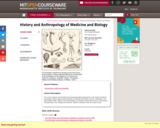
This course explores recent historical and anthropological approaches to the study of life, in both medicine and biology. After grounding our conversation in accounts of natural history and medicine that predate the rise of biology as a discipline, we explore modes of theorizing historical and contemporary bioscience. Drawing on the work of historian William Coleman, we examine the forms, functions, and transformations of biological and medical objects of study. Along the way we treat the history of heredity, molecular biology, race, medicine in the colonies and the metropole, and bioeconomic exchange. We read anthropological literature on old and new forms of biopower, at scales from the molecular to the organismic to the global. The course includes readings from the HASTS Common Exam List. The aim of this seminar is to train students to be participants in scholarly debates in the humanities, social sciences, and natural sciences about the nature of life, the body, and biomedicine.
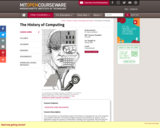
Examines the development of computing techniques and technology in the nineteenth and twentieth centuries, particularly critical evaluation of how the very idea of "computer" changes and evolves over time. Emphasis is on technical innovation, industrial development, social context, and the role of government. Topics include Babbage, Hollerith, differential analyzers, control systems, ENIAC, radar, operations research, computers as scientific instruments, the rise of "computer science," artificial intelligence, personal computers, and networks. Includes class visits by members of the MIT community who have made important historical contributions. This course focuses on one particular aspect of the history of computing: the use of the computer as a scientific instrument. The electronic digital computer was invented to do science, and its applications range from physics to mathematics to biology to the humanities. What has been the impact of computing on the practice of science? Is the computer different from other scientific instruments? Is computer simulation a valid form of scientific experiment? Can computer models be viewed as surrogate theories? How does the computer change the way scientists approach the notions of proof, expertise, and discovery? No comprehensive history of scientific computing has yet been written. This seminar examines scientific articles, participants' memoirs, and works by historians, sociologists, and anthropologists of science to provide multiple perspectives on the use of computers in diverse fields of physical, biological, and social sciences and the humanities. We explore how the computer transformed scientific practice, and how the culture of computing was influenced, in turn, by scientific applications.
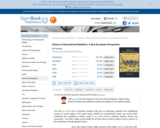
Existing textbooks on international relations treat history in a cursory fashion and perpetuate a Euro-centric perspective. This textbook pioneers a new approach by historicizing the material traditionally taught in International Relations courses, and by explicitly focusing on non-European cases, debates and issues.
The volume is divided into three parts. The first part focuses on the international systems that traditionally existed in Europe, East Asia, pre-Columbian Central and South America, Africa and Polynesia. The second part discusses the ways in which these international systems were brought into contact with each other through the agency of Mongols in Central Asia, Arabs in the Mediterranean and the Indian Ocean, Indic and Sinic societies in South East Asia, and the Europeans through their travels and colonial expansion. The concluding section concerns contemporary issues: the processes of decolonization, neo-colonialism and globalization – and their consequences on contemporary society.
History of International Relations provides a unique textbook for undergraduate and graduate students of international relations, and anybody interested in international relations theory, history, and contemporary politics.
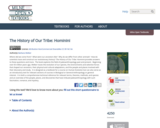
Where did we come from? What were our ancestors like? Why do we differ from other animals? How do scientists trace and construct our evolutionary history? The History of Our Tribe: Hominini provides answers to these questions and more. The book explores the field of paleoanthropology past and present. Beginning over 65 million years ago, Welker traces the evolution of our species, the environments and selective forces that shaped our ancestors, their physical and cultural adaptations, and the people and places involved with their discovery and study. It is designed as a textbook for a course on Human Evolution but can also serve as an introductory text for relevant sections of courses in Biological or General Anthropology or general interest. It is both a comprehensive technical reference for relevant terms, theories, methods, and species and an overview of the people, places, and discoveries that have imbued paleoanthropology with such fascination, romance, and mystery.
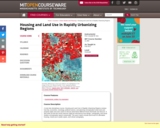
A truly inter-disciplinary course, Housing and Land Use in Rapidly Urbanizing Regions reviews how law, economics, sociology, political science, and planning conceptualize urban land and property rights and uses cases to discuss what these different lenses illuminate and obscure. It also looks at how the social sciences might be informed by how design, cartography, and visual studies conceptualize space's physicality. This year's topics include land trusts for affordable housing, mixed-use in public space, and critical cartography.
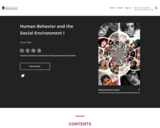
This OER textbook is designed for use in Human Behavior and the Social Environment (HBSE) - I, which is a required course in all accredited schools of social work . This text examines human behavior throughout the life span, including stage development and common theoretical perspectives in Social Work. Theories are presented to coincide with important developmental, social, and cultural issues.
Specific OER material reviewed: Human Behavior and the Social Environment I, by Susan Tyler (2020). University at Arkansas Pressbooks. Available at: https://uark.pressbooks.pub/hbse1/
Overall rating 1-5 stars
Each area rated is between 1-5
Comprehensiveness Rating: 5
The textbook covers all relevant content areas usually included in a HBSE I textbook or course. The authors introduce a range of social work and developmental theories, perspectives and constructs which will be helpful to prepare new students for professional work.
Content Accuracy Rating: 4
The content is appropriate and largely accurate, although at times limited in depth or lacking cultural context.
Relevance/Longevity Rating: 4
The textbook content is mostly up-to-date with recent and seminal scholarly sources, concepts, data and trends. Some sources are outdated. For instance, more recent research and perspectives are warranted in content around adolescent gender and sexual identity.
Clarity Rating: 4
The text is easy to read and follow, which is ideal for students reading online. There are frequent grammatical and capitalization errors. At times, descriptions of theories and constructs are vague or lacking clarity.
Consistency Rating: 5
The text is consistent in terms of terminology and framework. Each chapter is arranged similarly so that concepts are presented in a consistent format. This seems to be well formatted to help students’ expectations of learning content in an organized way.
Modularity rating: 5
Overall, the text is well written, and students will appreciate how the content is presented in an easily accessible format. Each section contains chapters that seem shorter than usual HBSE I textbooks, but that should allow instructors to be able to reorganize the chapters to align with their own style and priorities when teaching the content, as well as integrate their own material.
Organization/Structure/Flow rating: 5
I appreciate the organization of the text; the sections are well organized to first introduce students to common perspectives in social work. There is a concise and succinct presentation of developmental theories following a life course perspective, starting with pre-pregnancy, and extending to late adult hood., Each section organized into physical, cognitive and psychosocial development. I very much appreciate the vignettes that start out the chapters, which I think can help with the challenges sometimes faced trying to link theory to practice.
Interface rating: 5
Overall, I think for a first semester of HBSE, this would be well received by students. Being an online textbook, it is well suited for the diverse methods of delivering content, including videos and photos. The videos will be very helpful to visual learners.
This book is easy to navigate.
Content is used effectively to emphasize the key concepts and ideas.
Grammatical Errors rating: 4
Overall, there are few typographical or grammatical errors. However, social work and theories are often capitalized throughout the book.
Cultural Relevance rating: 4
I would like to see an updated and more extensive presentation of anti-racism, colonialism, and historical trauma. I think this would be a needed addition to the text. Specifically enhanced content on the impact of racism and trauma on human development and health is important content for social work students.
Comments
We would highly consider this text for use with HBSE I students with additional content to cover the impact of trauma and structural oppression on development and health. Overall, we think students will appreciate the diverse methods of delivering content in the textbook and its readability. Informal review by several MSW students confirmed interest in utilizing a textbook that had alternate types of methods for delivering content and was accessible on their computers at no cost.
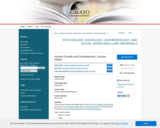
This set of lecture slides was created under a Round Four ALG Textbook Transformation Grant with an accompanying question library for tests and quizzes. The course uses the free and open Human Development sections of Boundless Psychology. Topics covered include:
Nature vs. Nurture
Piaget
Attachment
Freud
Erikson
Kohlberg
Childhood Development
Adolescent Development
Adulthood Development
Late Adulthood
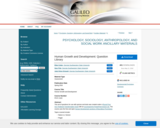
This set of questions for use with quizzes and tests was created under a Round Four ALG Textbook Transformation Grant with an accompanying PowerPoint lecture set. The course uses the free and open Human Development sections of Boundless Psychology. Topics covered include:
Nature vs. Nurture
Piaget
Attachment
Freud
Erikson
Kohlberg
Childhood Development
Adolescent Development
Adulthood Development
Late Adulthood
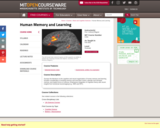
Surveys the literature on the cognitive and neural organization of human memory and learning. Includes consideration of working memory and executive control, episodic and semantic memory, and implicit forms of memory. Emphasizes integration of cognitive theory with recent insights from functional neuroimaging (e.g., fMRI and PET). Alternate years.
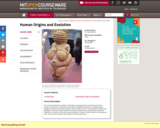
Examines the dynamic interrelations among physical and behavioral traits of humans, environment, and culture to provide an integrated framework for studying human biological evolution and modern diversity. Topics include issues in morphological evolution and adaptation; fossil and cultural evidence for human evolution from earliest times through the Pleistocene; evolution of tool use and social behavior; modern human variation and concepts of race. Includes study of stone artifacts and fossil specimens.
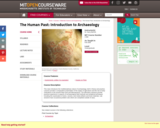
Archaeology reconstructs ancient human activities and their environmental contexts. Drawing on case studies in contrasting environmental settings from the Near East and Mesoamerica, considers these activities and the forces that shaped them. In laboratory sessions students encounter various classes of archaeological data and analyze archaeological artifacts made from materials such as stone, bone, ceramics, glass, and metal. These analyses help reconstruct the past. This class introduces the multidisciplinary nature of archaeology, both in theory and practice. Lectures provide a comparative examination of the origins of agriculture and the rise of early civilizations in the ancient Near East and Mesoamerica. The laboratory sessions provide practical experience in aspects of archaeological field methods and analytical techniques including the examination of stone, ceramic, and metal artifacts and bone materials. Lab sessions have occasional problem sets which are completed outside of class.
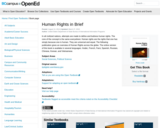
In all civilized nations, attempts are made to define and buttress human rights. The core of the concept is the same everywhere: Human rights are the rights that one has simply because one is human. They are universal and equal. The following pubilcation gives an overview of Human Rights across the globe.
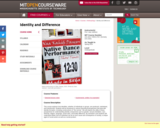
This course explores how identities, whether of individuals or groups, are produced, maintained, and transformed. Students will be introduced to various theoretical perspectives that deal with identity formation, including constructions of "the normal." We will explore the utility of these perspectives for understanding identity components such as gender, sexual orientation, race, ethnicity, religion, language, social class, and bodily difference. By semester's end students will understand better how an individual can be at once cause and consequence of society, a unique agent of social action as well as a social product.
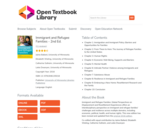
Immigrant and Refugee Families: Global Perspectives on Displacement and Resettlement Experiences uses a family systems lens to discuss challenges and strengths of immigrant and refugee families in the United States. Chapters address immigration policy, human rights issues, economic stress, mental health and traumatic stress, domestic violence, substance abuse, family resilience, and methods of integration.
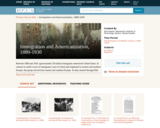
This collection uses primary sources to explore immigration to the US and immigrant Americanization between 1880 and 1930. Digital Public Library of America Primary Source Sets are designed to help students develop their critical thinking skills and draw diverse material from libraries, archives, and museums across the United States. Each set includes an overview, ten to fifteen primary sources, links to related resources, and a teaching guide. These sets were created and reviewed by the teachers on the DPLA's Education Advisory Committee.
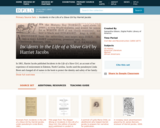
This collection uses primary sources to explore Incidents in the Life of a Slave Girl by Harriet Jacobs. Digital Public Library of America Primary Source Sets are designed to help students develop their critical thinking skills and draw diverse material from libraries, archives, and museums across the United States. Each set includes an overview, ten to fifteen primary sources, links to related resources, and a teaching guide. These sets were created and reviewed by the teachers on the DPLA's Education Advisory Committee.
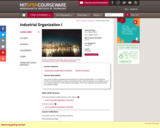
Covers theoretical and empirical work dealing with the structure, behavior, and performance of firms and markets and core issues in antitrust. Topics include: the organization of the firm, monopoly, price discrimination, oligopoly, and auctions. Theoretical and empirical work are integrated in each area.
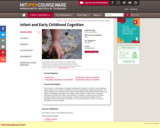
This course is an introduction to cognitive development focusing on children's understanding of objects, agents, and causality. It develops a critical understanding of experimental design. The course discusses how developmental research might address philosophical questions about the origins of knowledge, appearance and reality, and the problem of other minds. It provides instruction and practice in written communication as needed for cognitive science research (including critical reviews of journal papers, a literature review and an original research proposal), as well as instruction and practice in oral communication in the form of a poster presentation of a journal paper.
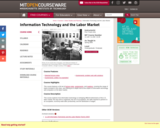
See description under subject 11.248.